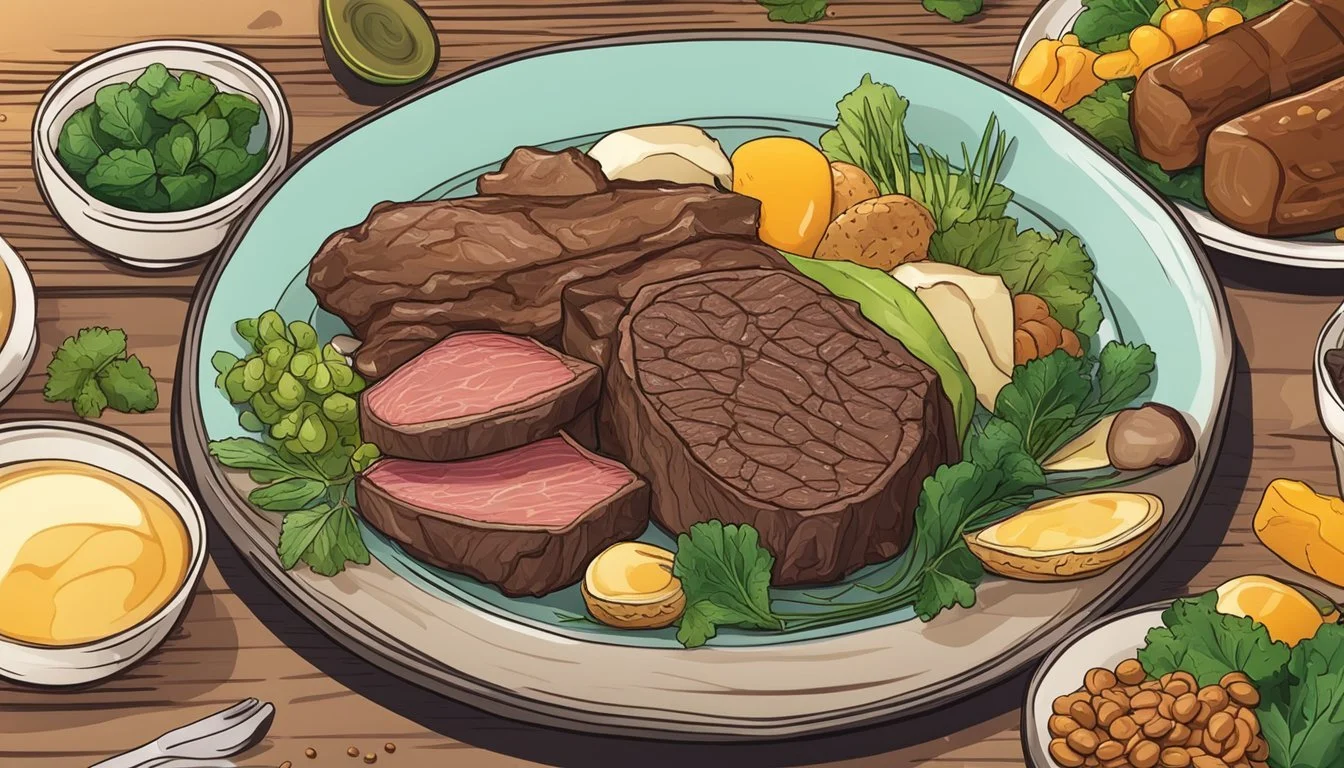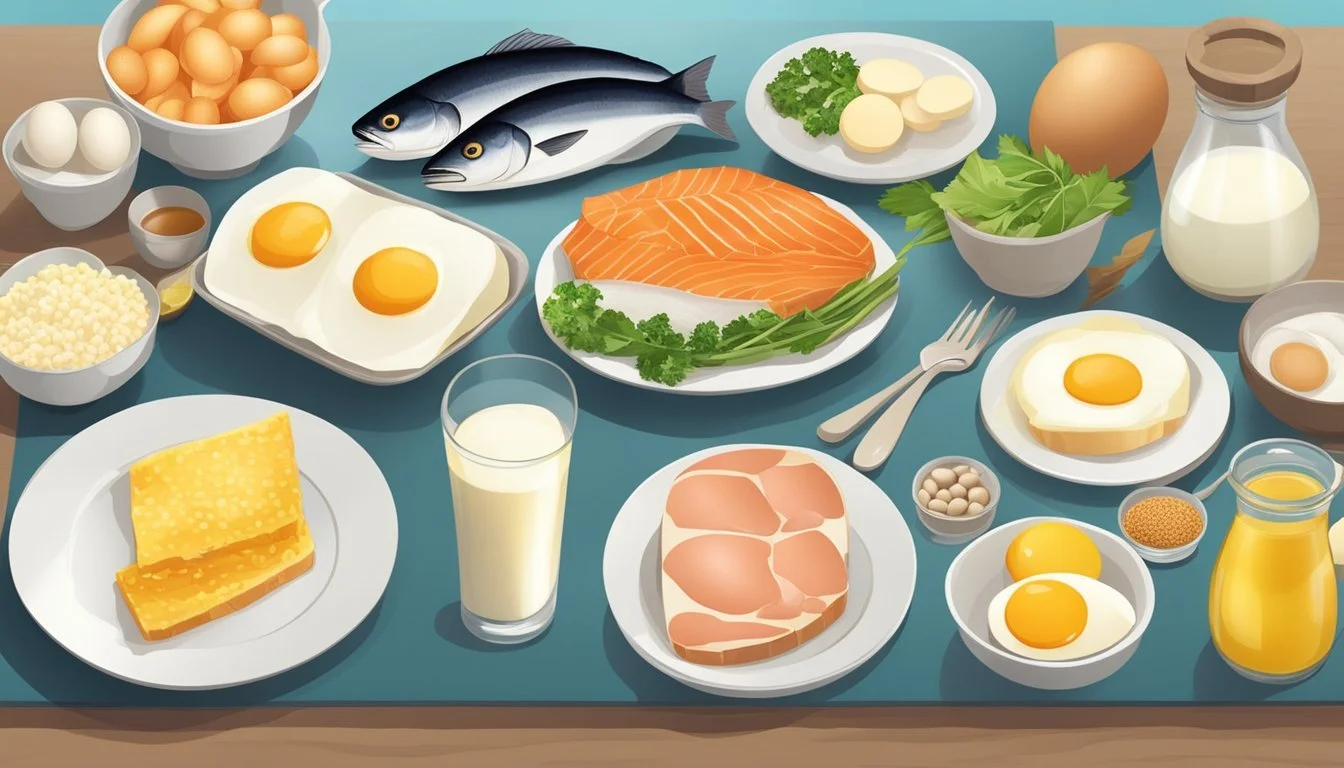Nutrient-Rich Foods to Combat Vitamin D Deficiency
Vitamin D is a crucial nutrient that supports various bodily functions, including maintaining healthy bones and a robust immune system. An insufficient intake of vitamin D can lead to deficiency, which may cause health issues such as weakened bones and a higher risk of infections.
Incorporating specific foods into one's diet can effectively address and prevent vitamin D deficiency. By understanding which foods are rich in vitamin D, individuals can make informed dietary choices to maintain optimal health and well-being.
1) Wild-Caught Salmon
Wild-caught salmon is a robust source of vitamin D, significantly contributing to daily nutritional needs. In a 100-gram serving, wild-caught salmon can provide nearly 1,000 IU of vitamin D, surpassing the daily recommended intake.
This high vitamin D content makes wild-caught salmon an excellent choice for combating vitamin D deficiency. Wild salmon's diet in natural habitats contributes to these elevated vitamin levels.
Omega-3 fatty acids in wild-caught salmon also provide numerous health benefits, such as supporting heart health and reducing inflammation. Including wild-caught salmon in your diet several times a week can help ensure adequate vitamin D intake.
Regular consumption of wild-caught salmon can be a practical and healthy dietary strategy. Its rich nutrient profile supports various aspects of health beyond just vitamin D levels.
2) Fortified Orange Juice
Fortified orange juice is a convenient option for those looking to increase their vitamin D intake. Many brands enrich their orange juice with vitamin D, making it a practical choice for individuals who may not get enough sunlight exposure.
Studies have shown that the vitamin D found in fortified orange juice can be as effective as supplements. This bioavailability means that your body can absorb vitamin D from the juice efficiently.
Orange juice often provides additional nutrients such as calcium, which works synergistically with vitamin D to support bone health. This combination makes fortified orange juice a valuable addition to a balanced diet.
Each serving of fortified orange juice typically contains a specific amount of vitamin D, and it can easily fit into daily routines. It's accessible and requires no additional preparation, making it an effortless way to boost vitamin D levels.
3) Mushrooms Exposed to Sunlight
Mushrooms exposed to sunlight can serve as an effective source of vitamin D. When mushrooms are placed in the sun or under ultraviolet (UV) light, they produce vitamin D₂. This process occurs similarly to how human skin synthesizes vitamin D when exposed to sunlight.
White button mushrooms, when exposed to midday sun for 15-20 minutes, can develop sufficient levels of vitamin D. Studies indicate they can provide more than 10 μg of vitamin D per 100g, meeting the recommended daily intake. This makes them a valuable dietary option for those looking to increase vitamin D intake without animal products.
Other mushrooms like Agaricus bisporus can also generate high amounts of vitamin D when exposed to UV light. A 75-gram serving of UV-exposed Agaricus bisporus can contain up to 18 μg of vitamin D, surpassing the daily recommended allowance. The vitamin D in these mushrooms remains stable during cooking and processing, ensuring the nutrient is preserved.
Sun-dried mushrooms represent another convenient method to boost vitamin D levels. Emphasizing their inclusion in diets can help combat deficiencies, particularly for vegans and those who have limited sun exposure.
4) Canned Tuna
Canned tuna is a convenient and affordable source of vitamin D. It is widely available and can be easily incorporated into various meals.
A three-ounce serving of canned tuna provides about 154 IU of vitamin D. Canned tuna also offers other essential nutrients such as protein and omega-3 fatty acids.
It's versatile and can be used in salads, sandwiches, and casseroles. The convenience of having a long shelf-life makes it a suitable option for stocking up the pantry.
5) Egg Yolks
Egg yolks are an excellent source of vitamin D, especially when derived from chickens raised on vitamin D-enriched feed. A medium egg yolk can provide around 40 IU of vitamin D, contributing to daily intake requirements.
Including eggs in one's diet is simple and versatile. They can be boiled, fried, or scrambled, making it easy to incorporate them into various meals.
It is essential to use whole eggs to gain the vitamin D benefits, as the nutrient is primarily found in the yolk. Egg yolks also offer additional nutrients, such as protein and essential fats, contributing to a balanced diet.
For individuals with dietary restrictions or preferences, eggs serve as a reliable and accessible source of vitamin D without requiring special preparation or cooking techniques.
6) Cod Liver Oil
Cod liver oil stands out as a potent source of vitamin D. It provides approximately 1,360 IU of vitamin D per tablespoon, which is a significant amount compared to many other food sources.
In addition to vitamin D, cod liver oil is rich in omega-3 fatty acids. These nutrients play key roles in reducing inflammation and supporting cardiovascular health.
Another benefit of cod liver oil is its content of vitamin A. Vitamin A supports immune function and eye health, working synergistically with vitamin D.
Cod liver oil has been traditionally used to boost immune function and promote healthy bones. Its natural composition makes it a highly bioavailable source of nutrients.
However, it's essential to monitor the intake due to high levels of vitamin A, which can be toxic in large amounts. Always consider recommended dietary guidelines and consult with a healthcare professional.
Regular consumption of cod liver oil can effectively address vitamin D deficiency while offering additional health benefits.
7) Fortified Milk
Fortified milk is cow’s milk that has been enhanced with additional nutrients. The primary focus of fortification is to add vitamin D, which is crucial for bone health and immune function. This makes fortified milk an effective dietary source to combat vitamin D deficiency.
In many countries, including Canada and Sweden, the fortification of cow’s milk with vitamin D is mandated by law. This ensures that the milk consumed by the population contributes to their vitamin D intake.
Different types of milk can be fortified, including whole, skim, and reduced-fat varieties. Plant-based milk alternatives, such as almond, soy, and oat milk, are also commonly fortified with vitamin D to provide a similar nutritional benefit.
Typically, a cup of fortified cow’s milk contains around 3 micrograms (120 IU) of vitamin D. Non-dairy alternatives generally offer between 2.5 and 3.6 micrograms per cup, depending on the brand and type of milk.
Fortified milk can be consumed on its own, used in cooking, or added to cereals and smoothies. This versatility makes it an easy addition to a diet aimed at increasing vitamin D intake.
8) Sardines
Sardines are an excellent source of vitamin D, providing significant amounts per serving. A typical 100-gram portion of sardines can supply around 68% of the recommended daily allowance (RDA) for vitamin D. This makes them a practical option for people looking to boost their vitamin D intake.
In addition to vitamin D, sardines are packed with other nutrients. These small fish are rich in vitamin B12, essential for nerve function and the production of red blood cells. Sardines also offer omega-3 fatty acids, which support cardiovascular health.
Sardines can be consumed in various ways, including grilled, baked, or straight from the can. They are a versatile ingredient that can be added to salads, pasta dishes, or enjoyed on toast. Their long shelf life makes them a convenient option for pantry stocking.
Including sardines in the diet can be particularly beneficial for individuals living in regions with limited sunlight exposure. They offer a natural and nutrient-dense way to address vitamin D deficiencies.
9) Beef Liver
Beef liver stands as an excellent source of vitamin D. This nutrient plays a crucial role in bone health, immune function, and cell growth. Incorporating beef liver into the diet can significantly contribute to adequate vitamin D intake.
In addition to vitamin D, beef liver is packed with other essential nutrients. It contains high levels of B vitamins, including B12, riboflavin, and niacin. These vitamins are vital for energy production and overall metabolic function.
Beef liver is also rich in iron, which supports oxygen transport and prevents fatigue. The protein content in beef liver further aids in muscle repair and maintenance. Its nutrient density makes it a valuable addition to diets aiming to improve vitamin D levels.
10) Swiss Cheese
Swiss cheese is a notable source of vitamin D. This type of cheese contains a moderate amount of this essential vitamin, which plays a key role in maintaining bone and immune health.
In addition to vitamin D, Swiss cheese also provides calcium and protein, both of which support bone strength. Including Swiss cheese in a balanced diet can be an effective way to help boost vitamin D intake.
Swiss cheese can be easily incorporated into various meals. It can be added to sandwiches, salads, or enjoyed on its own as a snack. This versatility makes it a convenient option for those looking to increase their vitamin D levels through diet.
Understanding Vitamin D Deficiency
Vitamin D deficiency arises from multiple factors, including insufficient sun exposure and dietary intake, and it can lead to significant health issues if untreated. Key symptoms include fatigue and weakened bones.
Causes of Vitamin D Deficiency
Several factors can contribute to vitamin D deficiency. One major cause is limited exposure to sunlight, which is essential for vitamin D synthesis in the skin. This is common in people who spend a lot of time indoors or live in areas with high pollution or long winters.
Dietary intake also plays a critical role. Vitamin D is present in only a few foods such as fatty fish, fish liver oils, and fortified products like milk and cereals. Inadequate consumption of these foods can result in a deficiency.
Certain medical conditions can interfere with the body’s ability to absorb or metabolize vitamin D, including celiac disease and Crohn's disease. Weight loss surgeries that reduce the size of the stomach or bypass parts of the small intestine can also affect absorption.
Symptoms of Vitamin D Deficiency
Vitamin D deficiency can manifest through a variety of symptoms, which can be subtle initially but become more severe over time. Common symptoms include fatigue and general muscle weakness, which can impact daily activities and quality of life.
Bone health is significantly affected by a lack of vitamin D. Individuals may experience bone pain and an increased risk of fractures, as vitamin D is crucial for calcium absorption which strengthens bones.
In children, severe deficiency can lead to rickets, characterized by soft and weak bones. In adults, osteomalacia, a condition involving bone softening, can occur. In both cases, the health implications are serious and require medical attention.
How Diet Affects Vitamin D Levels
Diet plays a crucial role in maintaining adequate vitamin D levels, which in turn support various bodily functions. Understanding how specific foods and absorption processes affect vitamin D levels can greatly enhance one's health.
Role of Vitamin D in the Body
Vitamin D is essential for calcium absorption, which is critical for maintaining bone health. It supports immune function and reduces inflammation. Deficiency in vitamin D can lead to conditions such as osteoporosis and rickets. Furthermore, vitamin D influences cell growth modulation, neuromuscular function, and immune function.
Consuming sufficient vitamin D-rich foods helps prevent these health issues. Fatty fish, like salmon and mackerel, are high in vitamin D. Fish liver oils, egg yolks, and fortified foods like milk, orange juice, and cereals are also good sources.
Impact of Diet on Vitamin D Absorption
Diet affects how well vitamin D is absorbed in the intestine. Vitamin D from animal sources, or vitamin D3, is more efficiently absorbed than vitamin D2, which comes from plant sources. Foods high in fat content aid in the absorption of vitamin D because it is a fat-soluble vitamin. Consuming mushrooms, especially those exposed to UV light, and cheese can be practical dietary options.
Medical conditions like Crohn's disease or celiac disease can impair absorption. People with these conditions need to monitor their vitamin D levels closely. Additionally, weight loss surgeries can reduce the body's ability to absorb vitamin D, necessitating dietary adjustments or supplementation.
Improving Vitamin D Intake Through Food
Foods high in vitamin D such as fatty fish, fortified dairy products, and specific types of mushrooms can significantly boost vitamin D levels. Pairing these with nutrient-rich companions can enhance absorption and support overall vitamin D function.
Combining Foods for Better Absorption
Fatty fish like salmon, mackerel, and tuna are excellent sources of vitamin D. Consuming these with healthy fats like avocado or olive oil can enhance absorption since vitamin D is fat-soluble.
Egg yolks and beef liver also contribute significant amounts and should be included regularly. Fortified foods, including milk (both dairy and non-dairy alternatives), orange juice, and breakfast cereals, offer additional sources, especially when paired with a balanced diet.
Nutrients That Support Vitamin D Function
Magnesium plays a crucial role in activating vitamin D, making foods like spinach, almonds, and pumpkin seeds essential. Vitamin K, found in leafy greens like kale and spinach, further aids in the metabolic function of vitamin D and calcium.
Zinc found in foods like oysters, beef, and chickpeas also supports vitamin D metabolism. Including these in your diet ensures that vitamin D functions effectively within the body, promoting bone health and immune function.
Consulting with a Healthcare Professional
When dealing with vitamin D deficiency, consulting a healthcare professional is crucial. They can provide personalized advice based on individual medical history and needs.
A healthcare professional can conduct blood tests to measure current vitamin D levels. This helps in determining the severity of the deficiency.
Benefits of consulting a healthcare provider:
Accurate diagnosis
Personalized treatment plans
Monitoring progress
For those with existing medical conditions, a healthcare professional can offer guidance on safe supplementation. Certain medications or conditions may interact with vitamin D supplements. It's important to consider this to avoid complications.
Regular follow-ups are important. They help assess the effectiveness of the treatment and make necessary adjustments.
In case of dietary needs, a nutritionist or dietitian can provide specific advice on vitamin D-rich foods. This complements medical recommendations by providing holistic care.
Always inform your healthcare provider about any over-the-counter supplements you are taking. This ensures a coordinated and safe approach to addressing the deficiency.







